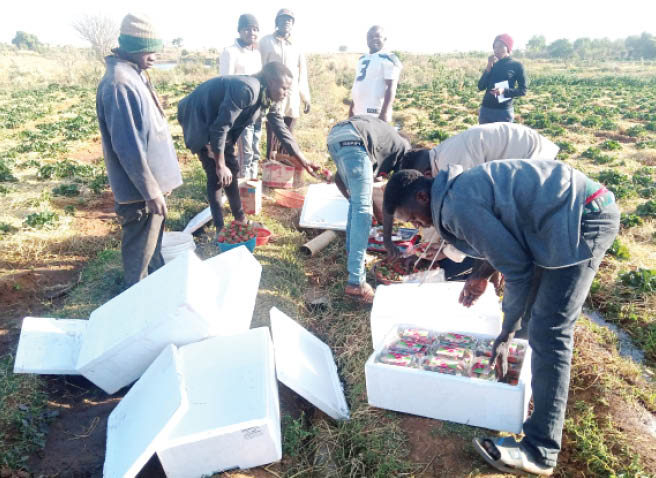Despite making N400, 000 weekly, strawberry farmer considers ending production
Gyang Matthew is one of the farmers who have, in the last four years, grown their farms from one acre to 1.8 hectares of strawberry. He has three hectares, out of which 1.8 is used for strawberry cultivation and 1.2 for growing carrot and lactose. From the 1.8 hectares of his strawberry, Mr Matthew is […]

Gyang Matthew is one of the farmers who have, in the last four years, grown their farms from one acre to 1.8 hectares of strawberry.
He has three hectares, out of which 1.8 is used for strawberry cultivation and 1.2 for growing carrot and lactose.
From the 1.8 hectares of his strawberry, Mr Matthew is providing employment to some youths and women in Chaha community.
Currently, on average he harvests 100 cartons of strawberry every week, with each carton weighing between 5 and 6 kilogrammes. January to April is the peak of production where harvest is usually bountiful.
A kiligramme costs N800 at this period of glut. The 100 cartons amount to 500kg and 600kg, which gives him an average of N400, 000 weekly. Some weeks he gets more than that. The harvest occurs twice (of more than 50 cartons per harvest) a week.
The farmer has 14 workers on his strawberry farm payroll. Ten of the workers get N1,000 daily; the remaining four are on monthly pay. Those on monthly pay take home N18, 000 because he feeds them three times a day and gives them accommodation in his house.
In his farm, after harvest on Saturday last week, Gyang explained some of the burning issues discouraging him and why, despite that, he decided to expand production.
“The journey so far has been good for us. What made me to improve the farming system is not the money aspect, these youths and women are not working. They do daily pay, and whatever you give them they become very happy because they have something to carter for their children,” he said.
Climate change affecting production
“The problem we face is climate change. Last year, it was a long rainy season. We were supposed to start harvesting from September, but unfortunately, the rain fell up to November. So, for two months we were losing the harvest. Within those two months, we lost the money we would have gotten from the harvest,” he said.
Beside climate change, fertilizers and herbicides are too expensive and heating up the cost of production, he added.
“If you are running at a loss without government intervention you will have challenges. For example, I farm two hectares of strawberry. The farm preparation alone costs me N2million before the laying of pipes and the diesel for the water-pumping engine for generator and all of that.
“In a season you put like N10m and you are getting something like N6 million. In this case, the motivation you have to help the poor and go into cultivation will be lost because you don’t have any support to go back to production another season,” Mr Matthew said.
Transportation is another challenge
On transportation and storage, he further said that at times one would go to the airport to send goods to Lagos and they would not take as much quantity as you want because they are calculating the number of kilogrammes they would carry on their cargoes.
“By February I will be harvesting 1000kg (one ton). The highest they would want to take from their cargo may be 200kg and I would be left with the remaining 800kg. So, when you calculate these losses due to weather, marketing and transportation, fertilizer, herbicides, labour and other factors, it will be a lot,” he explained.
